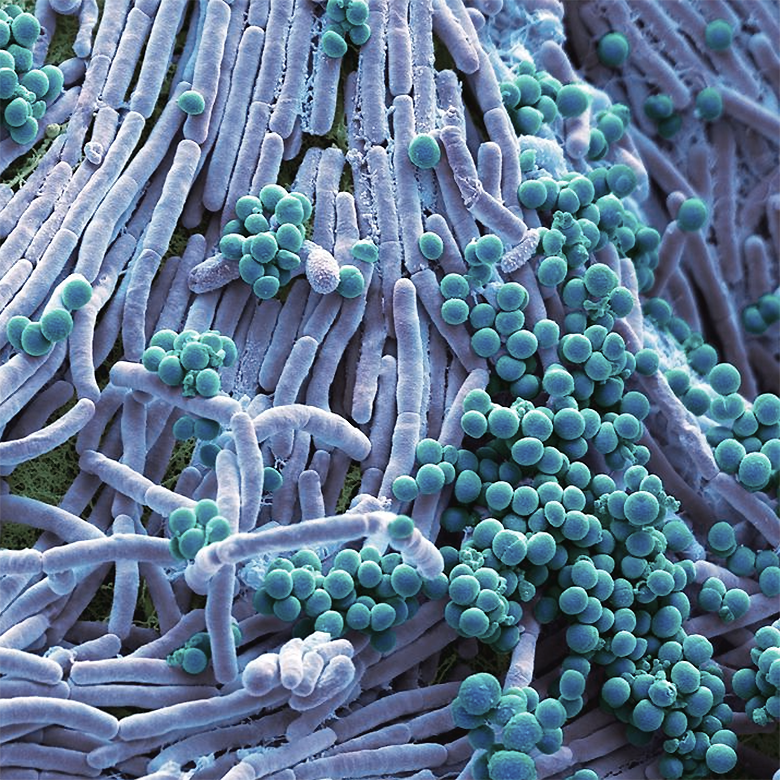It's a little scary how successfully we've been programmed to fear all bacteria. Fortunately, there is more and more talk about "friendly" bacteria and products such as kefir or kombucha are appearing more often on store shelves. Unfortunately, products from supermarkets are quite a poor option in comparison to properly fermented products and benefits they offer - they are most often made of pasteurized milk with a few strains of bacteria added later - that is not exactly like our mothers and grandmothers fermented... If you have to buy, it's worth searching for homemade preserves at a market or finding people who sell such things online.
And why should we care about the microbiome? It is estimated that in the body of a healthy person there are about 20-30 thousand types of bacteria. If you count all the genes of bacteria in the human body, there are more of them than the human genes. One might be tempted to say that we are more a collection of microorganisms than humans!🤯 They fulfil a variety of roles, the basic of which is, for example, aid in digestion and absorption of micronutrients. Our intelligent system of bacteria also takes care of the digestive barrier, which is designed to stop any toxins from food and the environment from entering the bloodstream. Let me add that this particular system extends from the excretory organs up to the very sinuses and nose. Examples of disturbances of this barrier are, of course, all digestive ailments (some of which we are often not aware of), but also problems with e.g. sinuses, runny/blocked nose, respiratory system infections, allergies or intolerances.
In order for our digestive system barrier to fulfill its primary function, it requires harmony in the amounts of individual bacteria, fungi and viruses. It's not that we have "good" or "bad" bacteria, but how many of each is there! Both an overgrowth and a shortage in the population of one microorganism will affect other populations - some of them are designed to keep other populations in a certain number (does it not remind you of the ecosystems on Earth? It is this macro and microcosm - mirror image!💙). When we introduce harmful chemicals, heavy metals, toxins, excess sugar into our body, we disturb this delicate harmony, which makes things very difficult! Probably the biggest problem here, however, is pesticides, i.e. plant protection products that kill not only pests but also bacteria. As a result of such a dysregulation, we may develop, for example, Candida fungus overgrowth, which causes various ailments. Meanwhile, when we regularly reach for fermented foods, we are able to rebuild the populations we need and reduce those that are harmful. Nature's intelligence is truly invaluable!
An additional difficulty is the limited communication between bacteria. This is due to the loss of certain particles that were in the soil in the past - unfortunately today there are much less of them due to commercialized agriculture, where there is no room for example for crop rotation or lands lying fallow temporarily - so that the soil has a chance to regenerate. For the same reason, we are not able to provide the body with, for example, a sufficient amount of magnesium through diet alone. Unfortunately, it seems that most farmers are not aware of the drawbacks of the current system and the advantages of sustainable agriculture.
Dr. Zach Bush is one of the leaders in the transformation of the agricultural system in the US, of course, there are also such people in Poland. In addition to educating about the microbial flora and pesticides, he created a dietary supplement containing these missing "communication" molecules (recovered from ancient soils) and although it may not be "cure-all", it is definitely an useful piece of the puzzle. As an example, it helped my boyfriend to recover from recurring sinus headaches in no time. If you believe the thousands of positive reviews, it seems to be solving many other problems.
Although the message of Dr. Bush definitely appeals to me, in the long run I don't like to rely on "external" products made by someone in a lab and sold commercially. Therefore, in my practice, apart from working with energy, I focus on delivering my body a variety of microorganisms through fermented foods, avoiding chemicals and excessive cleaning (especially our beloved disinfection!), as well as choosing organic products to reduce the consumption of pesticides as much as possible. Unfortunately, it is impossible to avoid them completely, since, as a result of widespread use, they are found in all water reservoirs, and thus also in the rain.
From the Ayurvedic point of view, we can support our bacteria and digestive system with all sorts of herbs and spices. It is also important to choose food products that are in season and available locally. After all, we are a part of Nature, so our body, bacteria and their needs change depending on the season and place where we live. It is worth limiting the use of herbal extracts in favour of whole herbs (they contain useful microorganisms), products imported from outside our country - let's remain a part of our own local ecosystem! - as well as frozen foods, which may retain nutritional value, but, I suspect, are losing a lot in the realm of bacteria (not to mention qi/prana - actually, I see an interesting relationship here! 🤔).


6 komentarzy
[…] jest tutaj np. odżywianie według Ajurwedy, o którym piszę na blogu. Wspominałam także o dbaniu o florę bakteryjną poprzez unikanie pestycydów i wszelakiej chemii w naszym […]
[…] dbałość o glebę, w której żyją nasze rośliny (a co za tym idzie żyjące w niej bakterie!). Stosuje się wyłącznie naturalne preparaty chorobo- i chwastobójcze, a także preparaty […]
[…] domowe kiszonki (niekoniecznie dużo, ale często!), które pomogą nam zbudować odporność (flora!) i przy okazji idealnie zaspokoją potrzebę smaku kwaśnego. Jeśli chodzi o owoce, skłaniamy […]
[…] warstwę śluzu w organiźmie, która chroni nas przed toksynami i stanowi dom dla naszej flory bakteryjnej. Jeśli nie chcesz wydawać pieniędzy na taką wodę, zrób ją sam/a. 😉 Pierwszym etapem, o […]
[…] Zacha Busha, o którym wspominałam już przedtem przy okazji notki na temat flory bakteryjnej (tutaj!). Naprawdę, jest możliwe zmęczyć i dotlenić całe ciało w 4 minuty, bez użycia […]
[…] Kawa niestety często pada ofiarą ogromnych ilości pestycydów, które niszczą naszą florę bakteryjną. Warto więc zwracać na to uwagę i sięgać po kawy ekologiczne (polecam np. kawy prażone […]